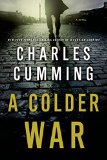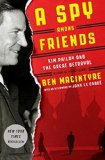Summary | Excerpt | Reviews | Beyond the book | Read-Alikes | Genres & Themes | Author Bio

Non-British readers are probably less familiar with the main subject of Charles Cumming's spy thriller than those in his home country. Cumming, a notable author of five spy novels to date, grounds his narrative in the legacy of the Cambridge Five, a 1950s spy ring. Cumming's story fuses the traditional conventions of the spy novel with a twenty-first century setting, coupling a quick read with an interesting part of British and Russian history.
The result proves that the spy novel, a genre that some might think to be stuck in the Cold War era, is far from dead.
The Trinity Six revolves around the main character of Sam Gaddis, a seasoned academic, recently divorced, who spends his time drinking with various London journalists and scholars (drinking seems to be a favorite pastime for all of the novel's characters, though only one is admittedly an alcoholic). Gaddis is somewhat boring. He's not a mere simpleton who is duped by MI6 and the KGB, but he does lack the suave intellect of most of his peers, such as the sharp, boozy journalist and the well-preserved, nonagenarian former MI6 agent. Occasionally, even Gaddis's girlfriend, an unemployed actress, appears to be relatively more cognizant of the political forces that come into play.
Many of Cumming's characters are dynamic and memorable, to the extent that they sometimes overshadow the novel's primary character. Several other characters, however, are just as flat as others are vivid: Gaddis's ex-wife appears only as a convenient narrative prop, and Gaddis's daughter is used purely for overdoses of pathos or as fodder for blackmail. Readers will, in fact, be hard-pressed to learn about Gaddis's personal life. The few glimpses into his life in academia are mainly presented to explain his motivations for uncovering the mystery surrounding the sixth member of the Russian spy ring. Any of Gaddis's motivations that extend beyond the professional realm, however, are either generic or nonexistent.
Cumming's story starts with a rapid pace that does not slow for the remainder of the novel. The first few chapters do little more than drop a few names and buzz through some haphazard scenes. Gradually, however, the narrative begins to bounce around Britain and continental Europe with purpose and direction. Once his pace is established, Cumming's knack for timing becomes apparent, with scenes that are neither too abrupt nor too drawn out. Gaddis rushes from Berlin to Vienna to Moscow, and the reader is happy to rush along with him.
Despite some rough spots, The Trinity Six contains that rare quality that compels the reader to keep the pages turning. It mixes some James Bond elements - pretty girls, lots of booze - with political history and an unpretentious protagonist. It contains the obligatory murders, hidden identities, and love affairs that one would expect to find in a spy novel. Some characters do appear stagnant, and I found myself wishing that they were more dynamic and contained emotional depth. Nevertheless, Cumming's knowledge of MI6 history and international relations is impressive, and his novel is a good read for people who are looking for a story that is fast without being flimsy.
BookBrowse Members Say
22 out of 23 BookBrowse members who reviewed this book gave it a thumbs up. Read their reviews here!
![]() This review was originally published in The BookBrowse Review in March 2011, and has been updated for the
April 2012 edition.
Click here to go to this issue.
This review was originally published in The BookBrowse Review in March 2011, and has been updated for the
April 2012 edition.
Click here to go to this issue.

If you liked The Trinity Six, try these:

by Charles Cumming
Published 2015
Cumming returns with MI6 agent Tom Kell (A Foreign Country), in a tour de force that will dazzle readers and critics alike.

by Ben Macintyre
Published 2015
Master storyteller Ben Macintyre's most ambitious work to date brings to life the twentieth century's greatest spy story.
Your guide toexceptional books
BookBrowse seeks out and recommends the best in contemporary fiction and nonfiction—books that not only engage and entertain but also deepen our understanding of ourselves and the world around us.